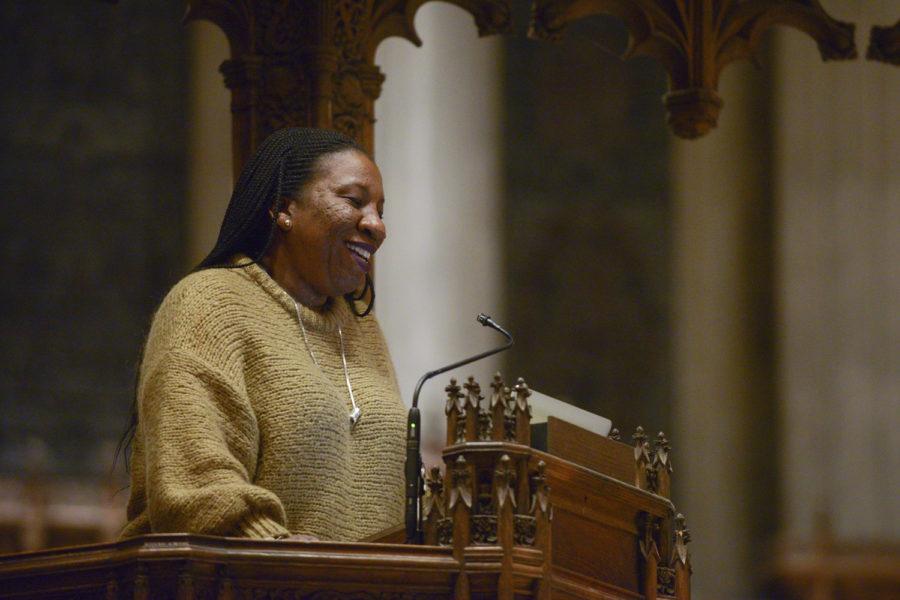Me too. Me too. Me too. It’s been all over the news. It’s been all over your Twitter, Facebook and Instagram feeds.
As sexual assault survivors of all identities continue to speak out about their stories, it’s easy to get caught up in the increasingly visible culture of feminism and girl power. Tarana Burke, founder of the #MeToo movement, visited Pittsburgh Tuesday to give a speech at the Calvary Episcopal Church in Shadyside about the virality of the movement she helped start. And she had an abundance of advice for the Pittsburgh community to keep it going.
Burke spoke emphatically about how everyone in the community needed to come together to truly unify over real resistance to structures of oppression. The time for token allegiance to the movement against sexual assault is over.
In the midst of all the hype, there are two important things to remember. First, this movement impacts everyone. And second, it’s more than just a tweet.
Burke emphasized that intersectional feminism is more nuanced than what Twitter users might have you believe. Content claiming to be intersectional appearing on the internet often seems more divisive than inclusive. Understanding privilege and standing up for issues that might not impact oneself are obviously important, but the term has been used to undermine significant movements for women’s rights — including the Women’s March.
Some of the responses to last year’s march seemed to care less about the size of crowds that came out to oppose sexism from President Donald Trump and more about the color composition of the marchers. For some, including Nigerian author and activist Luvvie Ajayi, there were simply too many white people for the event to be a legitimate expression of support for women’s rights.
Intersectional feminism means everyone is welcome, no matter their identity. It relays that we should not ignore the other identities of women when examining their discrimination. Of course, systems of race, class, gender, sexuality and others can all act together, and we should not let this evade us. But no one should be made to feel unwelcome in women’s movements because they aren’t subject to every form of oppression there is. Inclusion is a fundamental pillar, and using the term “intersectional feminism” to divide women is not promoting its true meaning.
This is not to deny that we do need to investigate our own experiences and how they relate to the #MeToo movement and intersectional feminism as a whole. But Burke pointed out Tuesday that many of the problems that continue to face women come from communities that face other forms of oppression.
“We live where all these rich, powerful white men have been taken down, and y’all [are] still stepping to R. Kelly,” Burke said, receiving an enthusiastic round of applause.
Kelly, prominent black singer-songwriter, has faced a long list of accusations of sexual misconduct throughout his career. Reports even surfaced last July alleging that he held young women inside his home against their will and controlled them in a cult-like atmosphere. The controversy has largely been avoided by those in the #MeToo movement — and Burke pointed out the hypocrisy of ignoring problematic individuals in certain communities.
The movement is important, and it requires all types of people. It’s time to rediscover how to hear one another — and exactly that began to take place at Tuesday’s talk. During a
Q&A session after Burke’s speech, a young community organizer spoke about the difficulties of women of color in gaining access to leadership roles in the community. Burke asked who in the audience would be willing to work with the woman, and several women — of all colors — raised their hands before the question even finished.
This speaks as a powerful metaphor for where #MeToo needs to move next. It is fantastic whenever issues we find important are trendy, but we cannot rely upon a moment in the spotlight alone to grow movements. As Burke advised the audience, we need to use our own ideas, missions, platforms and stories to push the fight forward.
“The solution is not [just] creating a hashtag,” Burke explained to the audience.
There are any number of ways to go beyond the relatively passive resistance of merely jumping on a hashtag bandwagon. Countless clubs at Pitt promote women’s issues, including the Campus Women’s Organization, Female Empowerment Movement and Strong Women Strong Girls, who were all present at the event. Some, such as Students Engaging in Conversations about Consent and Sexuality, specifically discuss and work against issues relating to sexual assault.
But while they’ve become a hotbed for sexual assault and the fight against it, college campuses can’t be the extent of the movement. An impressive panel of local organizations present at Tuesday’s event is working to effect change locally, and getting involved with them is a fantastic way to transform Pittsburgh. They include the Women & Girls Foundation, Gwen’s Girls, the Women’s Law Project, and Pittsburgh Action Against Rape.
The groups’ presence last night proves that these organizations are willing to keep working on issues surrounding sexual harassment and assault in the long-term, not just in the moment.
The solution to widespread injustice and intersecting sources of oppression is not simply bringing attention to it over the internet. Perhaps there is no perfect solution, but there are a lot of things we can do to help. Impact individual change. Join organizations that promote true intersectional feminism. When friends are playing music, request Beyonce, not R. Kelly. Most importantly, take your mission far beyond the hashtag, and never stop expanding your platform.
In Burke’s own words, “It really is going to take everybody.”
Alexis primarily writes about local issues and student life for The Pitt News. Write to Alexis at alb413@pitt.edu.



